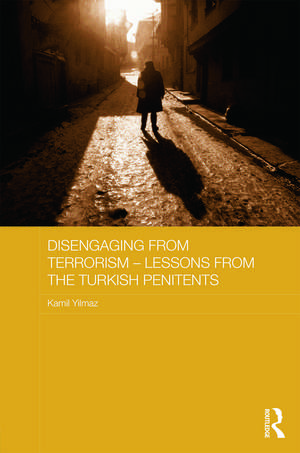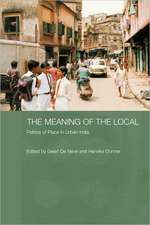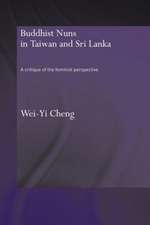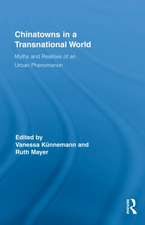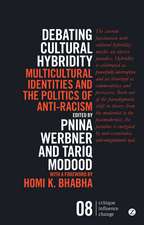Disengaging from Terrorism - Lessons from the Turkish Penitents: Routledge Transnational Crime and Corruption
Autor Kamil Yılmazen Limba Engleză Hardback – 22 apr 2014
| Toate formatele și edițiile | Preț | Express |
|---|---|---|
| Paperback (1) | 172.64 lei 6-8 săpt. | |
| Taylor & Francis – 10 mai 2017 | 172.64 lei 6-8 săpt. | |
| Hardback (1) | 584.41 lei 6-8 săpt. | |
| Taylor & Francis – 22 apr 2014 | 584.41 lei 6-8 săpt. |
Preț: 584.41 lei
Preț vechi: 751.08 lei
-22% Nou
Puncte Express: 877
Preț estimativ în valută:
111.83€ • 115.37$ • 93.32£
111.83€ • 115.37$ • 93.32£
Carte tipărită la comandă
Livrare economică 27 martie-10 aprilie
Preluare comenzi: 021 569.72.76
Specificații
ISBN-13: 9780415719049
ISBN-10: 0415719046
Pagini: 266
Ilustrații: 5 black & white illustrations, 5 black & white tables, 5 black & white line drawings
Dimensiuni: 156 x 234 x 18 mm
Greutate: 2.84 kg
Ediția:New.
Editura: Taylor & Francis
Colecția Routledge
Seria Routledge Transnational Crime and Corruption
Locul publicării:Oxford, United Kingdom
ISBN-10: 0415719046
Pagini: 266
Ilustrații: 5 black & white illustrations, 5 black & white tables, 5 black & white line drawings
Dimensiuni: 156 x 234 x 18 mm
Greutate: 2.84 kg
Ediția:New.
Editura: Taylor & Francis
Colecția Routledge
Seria Routledge Transnational Crime and Corruption
Locul publicării:Oxford, United Kingdom
Public țintă
Postgraduate and UndergraduateCuprins
1. Introduction 2. Historical and Social Contexts 3. Separation Stage: Turkish Penitents’ Paths to Political Violence 4. Transition Stage I: Life in the PKK and Revolutionary Groups 5. Transition Stage II: Causes of Disillusionment and Exit from the Groups 6. Transition Stage III: Difficulties and Resources for Disengagement 7. Reincorporation: Politics of Repentance and Life after Violence 8. Conclusion
Recenzii
"This is an excellent and conceptually innovative ethnographic examination of the processes of individual
disengagement from terrorism in Turkey through an interview-based reconstruction of the lives of 13 former
terrorists from the Kurdish PKK as well as left-wing revolutionary terrorist organizations. It explores whether obstacles and inhibitions were present for leaving a group, analyzing also the differences and similarities between the penitents who left a leftist-revolutionary group and those who exited from a separatist organization such as the PKK. In addition, the author analyzes what their current positions in society and 'states of mind” are. This will contribute greatly to the stability of any given society by enticing active members of terrorist organizations to disengage from terrorism."
—Joshua Sinai, Perspectives on Terrorism, Volume 12, Issue 4
disengagement from terrorism in Turkey through an interview-based reconstruction of the lives of 13 former
terrorists from the Kurdish PKK as well as left-wing revolutionary terrorist organizations. It explores whether obstacles and inhibitions were present for leaving a group, analyzing also the differences and similarities between the penitents who left a leftist-revolutionary group and those who exited from a separatist organization such as the PKK. In addition, the author analyzes what their current positions in society and 'states of mind” are. This will contribute greatly to the stability of any given society by enticing active members of terrorist organizations to disengage from terrorism."
—Joshua Sinai, Perspectives on Terrorism, Volume 12, Issue 4
Descriere
This book presents an in-depth study of thirteen individuals who moved away from terrorist activity in Turkey. Setting their stories in the context of political violence in support of Kurdish independence and the Turkish state's response, the book examines what motivated the individuals to become involved in terrorism, how they participated, why they became disillusioned, and how they coped with disengagement. The book then draws out lessons on how to encourage individuals to move away from terrorism, and on how states can assist. The book is a particularly rich source on why people move away from terrorism as most books concentrate on why people become terrorists, and on "terrorist profiling".
